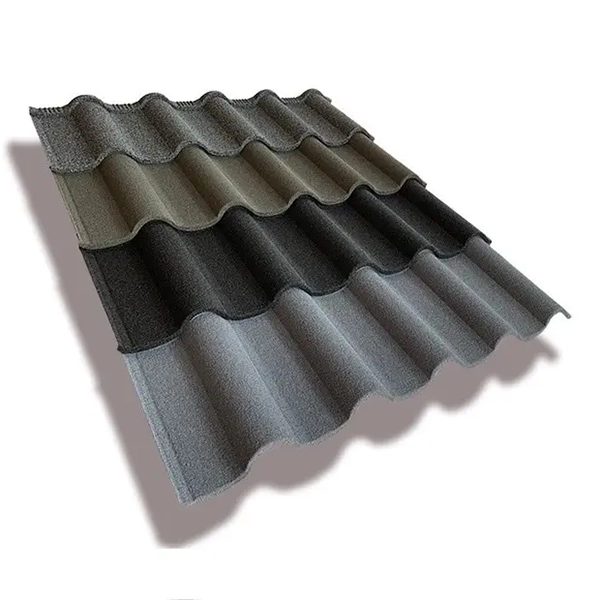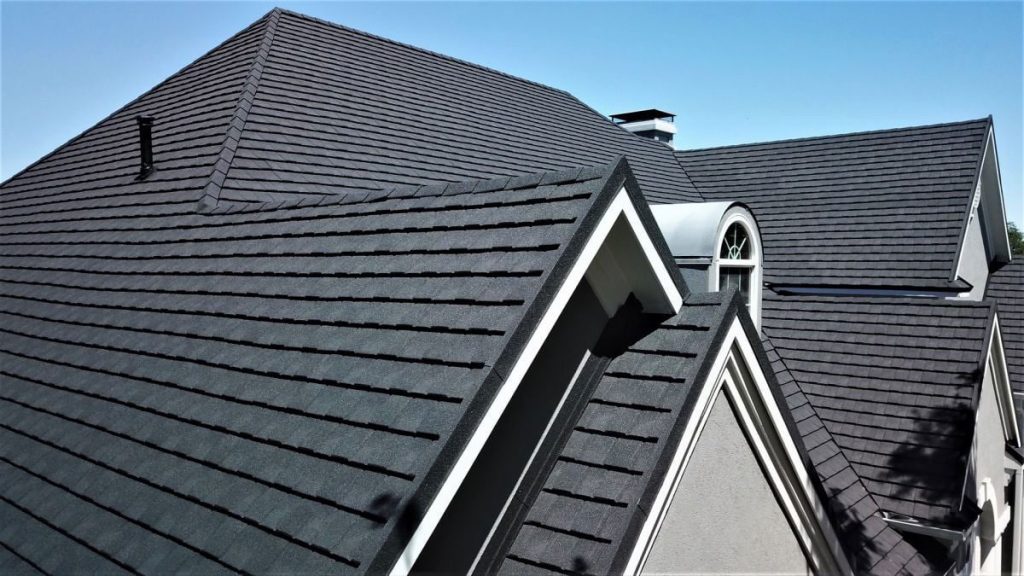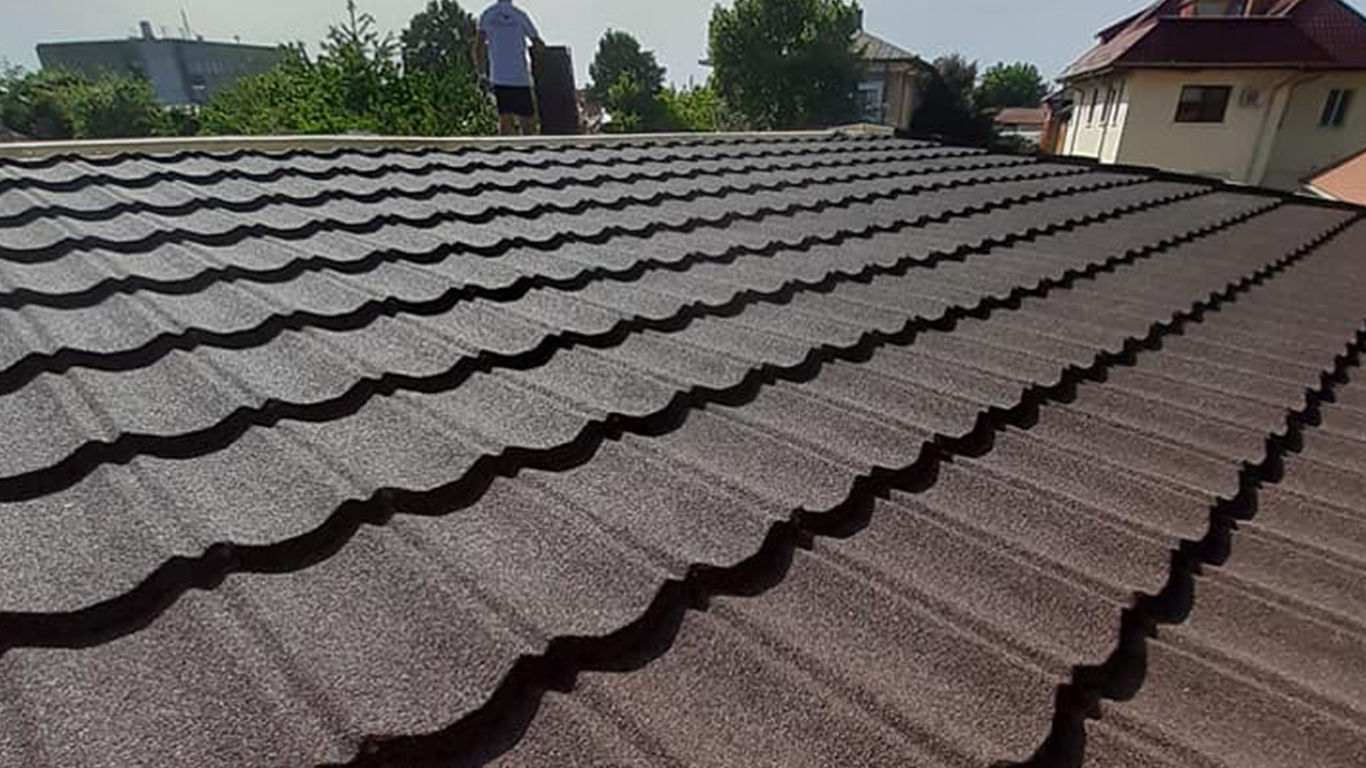
Classic stone coated roofing tiles are built for all weather. You get strong protection for your home against hail, high winds, and heavy rain. These tiles combine steel and a stone coating, which boosts durability and keeps your roof looking great. Stone coated roofing tiles help prevent common roofing problems:
- Damage from hail, wind, and rain
- Granule loss and denting
- Color fading in harsh weather
With these tiles, your home stays safe and stylish in any climate. Choose stone coated roofing tiles for lasting durability and peace of mind.
Key Takeaways
- Stone coated roofing tiles offer strong protection against hail, wind, rain, and fire, keeping your home safe in all weather.
- These tiles have a steel core with a stone coating that resists fading, corrosion, and damage for up to 50 years or more.
- You can choose from many styles and colors that mimic natural materials like slate, wood, or clay to match your home’s look.
- Stone coated tiles are lightweight, making installation easier and reducing stress on your roof structure.
- New innovations improve durability, energy efficiency, and even add self-healing and smart monitoring features.
- These tiles save energy by reflecting sunlight and insulating your home, lowering cooling and heating costs.
- Maintenance is simple and low-cost since the tiles resist moss, algae, cracking, and require only occasional cleaning.
- Always pick certified tiles and hire experienced installers to ensure your roof lasts long and performs well.
What Are Classic Stone Coated Roofing Tiles
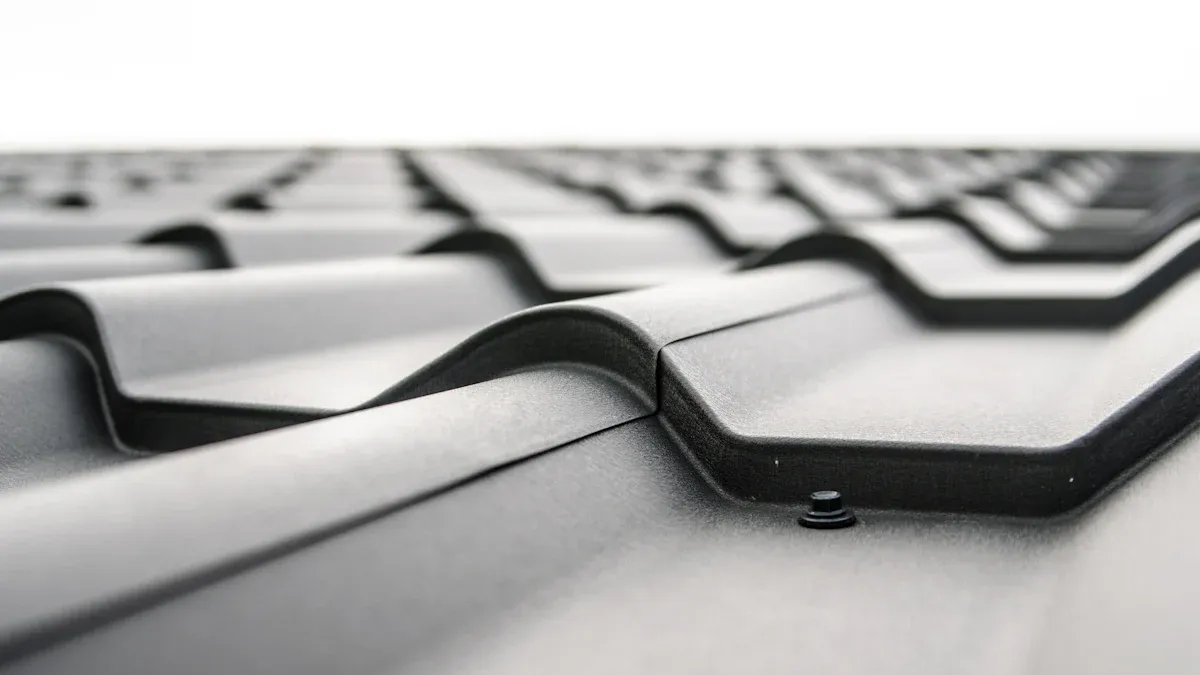
Material and Structure
You get advanced protection with classic stone coated roofing tiles because of their multi-layered design. Each tile uses a steel core for strength and flexibility. The steel core comes coated with an aluminum-zinc alloy, which prevents rust and corrosion. On top of this, manufacturers add layers that boost performance and durability.
| Layer/Component | Function and Properties |
|---|---|
| Overglaze | Semi-gloss finish providing added protection. |
| Stone Granules | Provide color, UV resistance, and surface coverage. |
| Basecoat | Enhances adhesion, UV protection, and color blending. |
| Acrylic Primer | Priming system that improves adhesion between layers. |
| Aluminum-Zinc Alloy Coating | Corrosion prevention and protection for the steel core. |
| Steel Core | Load-bearing, flexible steel sheet with thickness from 0.33mm to 0.55mm. |
These tiles use natural stone chips for color and texture. The stone chips resist fading and keep your roof looking new for years. Acrylic resin glue holds the layers together, sealing out water and stopping algae growth. You benefit from tiles that are lightweight, waterproof, and built to last up to 50 years. The types of stone coated roofing tiles all share these core features, but each type may have unique profiles or finishes.
Appearance and Style
Stone coated roofing tiles give you more choices than traditional roofing. You can pick from a wide range of natural stone finishes and profiles. These tiles come in vibrant colors that stay bright, even after years of sun and rain. The coatings prevent fading and discoloration, so your roof keeps its fresh look.
- You can choose tiles that mimic slate, wood shakes, or classic clay tiles.
- The types of stone coated roofing tiles include Classic, Heritage, Bond, and Milano profiles.
- Each type fits both modern and traditional homes.
- The tiles stay clean and do not need frequent washing.
- You get a lightweight roof that looks heavy and luxurious.
| Feature | Stone-Coated Roofing Tiles | Traditional Roofing Materials |
|---|---|---|
| Appearance & Style | Mimic slate or wood shakes; vibrant colors; natural textures | Limited earthy tones; fewer design options |
| Versatility | Fit modern and classic homes; many types and profiles | Mostly traditional styles |
| Durability & Maintenance | Stay bright and clean; resist fading and stains | Can fade and need regular cleaning |
| Weight & Installation | Lightweight; easy to install | Heavier; harder to install |
You can match the types of stone coated roofing tiles to your home’s style, making your roof both practical and beautiful.
2025 Innovations
In 2025, you will see new features in stone coated roofing tiles that make them even better. Manufacturers now use advanced coatings, like magnetron sputtering, to create a seven-layer protective system. This technology boosts UV resistance and stops corrosion. Some tiles now have self-healing superhydrophobic coatings. These coatings repair small scratches and improve water resistance, so your roof lasts longer.
You also get energy-saving features. New types of stone coated roofing tiles reflect sunlight, keeping your home cooler. Some tiles work with solar panels or have dynamic thermal management systems. You can monitor your roof’s performance in real time with IoT-enabled sensors.
- Eco-friendly materials use recyclable steel and natural stone granules.
- Tiles resist algae, moss, and hail damage.
- Maintenance stays low, even as features improve.
- The lifespan of these tiles now exceeds 50 years.
Tip: When you choose the latest types of stone coated roofing tiles, you invest in a roof that saves energy, lasts longer, and looks great.
Durability and Weather Resistance
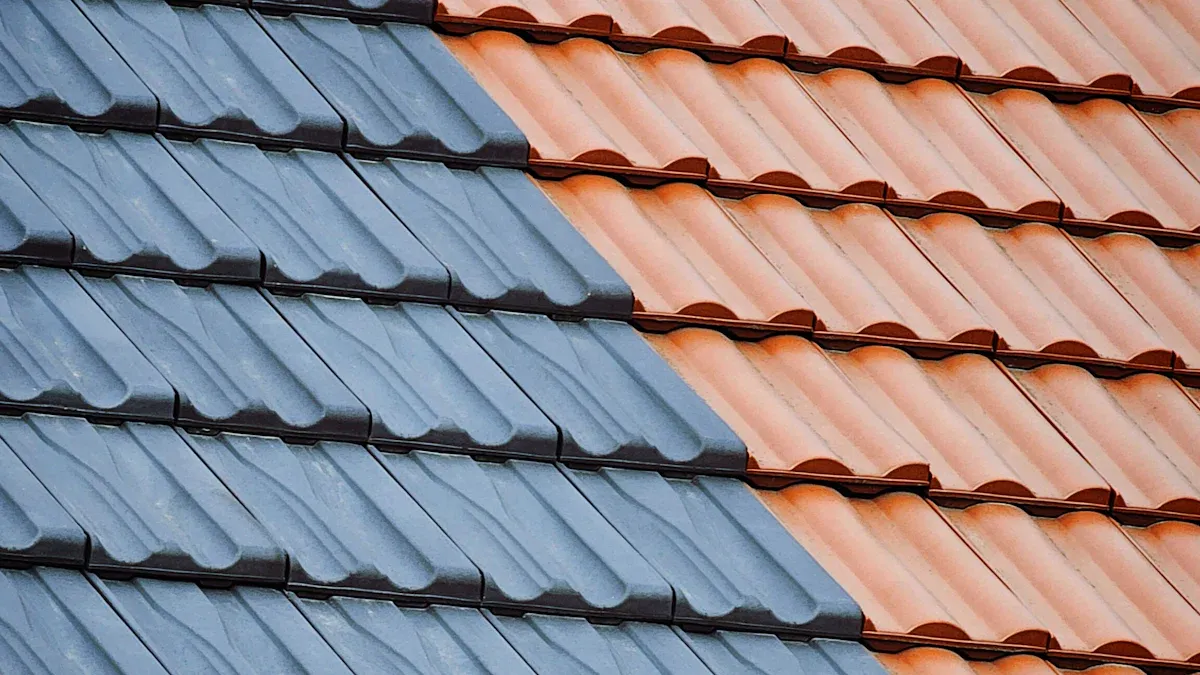
Extreme Weather Performance
You want your roof to stand strong in every season. Stone coated roofing tiles deliver top performance when you face hail, heavy rain, snow, or high winds. These tiles use a steel core and a multi-layered design that gives you unmatched durability and resistance to weather conditions. The interlocking system keeps each tile secure, even during hurricane-force winds. You get peace of mind knowing your roof can handle the toughest storms.
- Stone coated roofing tiles achieve a Class 4 impact rating, which means they resist large hailstones without cracking.
- The tiles withstand wind speeds up to 120 mph, making them ideal for areas with hurricanes or strong storms.
- You benefit from a Class A fire resistance rating, the highest available for residential roofing.
- The aluminum-zinc alloy coating meets AZ50 standards, protecting your roof from corrosion and extending its lifespan.
- The unique interlocking design prevents wind uplift, keeping your tiles in place during extreme weather.
| Performance Aspect | Stone-Coated Steel Roofing Tiles | Comparison to Other Roofing Types |
|---|---|---|
| Hail Resistance | Class 4 impact resistance (highest rating) | Superior to asphalt shingles and cedar shakes |
| Wind Resistance | Engineered to withstand hurricane-force winds | More durable than many traditional roofing types |
| Snow Load Durability | Resilient against freeze-thaw cycles and heavy snow loads | Better longevity and strength than concrete tiles |
| Warranty | Up to 50 years | Longer than asphalt (25 years) and cedar (40 years) |
| Insurance Benefits | May qualify for premium reductions due to durability | Not commonly available for other roofing types |
| Weight | Lightweight compared to ceramic tiles | Reduces structural load |
| Additional Features | Ventilation and moisture control enhancing weather performance | Not typical in traditional roofing materials |
Stone coated roofing tiles outperform traditional materials like asphalt shingles, clay, and wood shakes. You get better resistance to weather conditions, less maintenance, and a longer-lasting roof. If you live in a region with heavy monsoons, such as Bangalore, you will find these the best waterproof roofing tiles for bangalore monsoon.
Tip: Choose stone coated roofing tiles for a roof that stands up to hail, wind, rain, and snow—year after year.
Longevity
When you invest in a roof, you want it to last. Stone coated roofing tiles give you long-term durability and value. The steel core, combined with protective coatings and natural stone chips, creates a roofing system that resists fading, corrosion, and damage from the elements. You get a roof that looks new and performs well for decades.
- Manufacturers offer warranties up to 50 years for classic stone coated roofing tiles.
- The galvalume steel substrate lasts 6 to 9 times longer than ordinary galvanized steel.
- Natural stone coatings protect against UV rays and weathering, so your tiles keep their color and strength.
- Compared to non-metal roofs, which last about 17 years, stone coated roofing tiles last 2 to 3 times longer.
- You spend less on repairs and replacements, thanks to the superior durability and resistance of these tiles.
You can trust your roof to protect your home for generations. The combination of advanced materials and smart design ensures you get the most out of your investment.
Energy Efficiency
Stone coated roofing tiles do more than protect your home—they help you save energy. The design and materials of these tiles provide excellent insulation and reflective properties. You keep your home cooler in summer and warmer in winter, which boosts energy efficiency and comfort.
- The tiles reflect sunlight, reducing heat absorption and lowering cooling costs.
- Insulating properties help maintain a stable indoor temperature, so you use less air conditioning and heating.
- The durability and weather resistance of the tiles ensure consistent thermal performance over time.
- Compared to traditional clay tiles, stone coated roofing tiles offer better reflective features, making them ideal for hot climates.
- You benefit from lower energy bills and a smaller carbon footprint.
Stone coated roofing tiles support energy efficiency in every season. Their advanced features help you create a comfortable, cost-effective, and eco-friendly home.
Note: Energy efficiency is not just about saving money. It also means you make a positive impact on the environment by reducing energy use.
Benefits of Stone Coated Roofing Tiles
Eco-Friendliness
You help the environment when you choose stone coated roofing tiles. These tiles use recyclable steel and natural stone granules, which means less waste goes to landfills. Manufacturers often use eco-friendly processes, so you reduce your carbon footprint from the start. The long lifespan of these tiles means you do not need to replace your roof as often, which saves resources and energy over time.
Stone coated roofing tiles also improve your home’s energy efficiency. Their reflective surfaces keep your house cooler in hot weather, so you use less air conditioning. This lowers your energy bills and reduces greenhouse gas emissions. When you look for the benefits of roofing tiles in bangalore, you will see that eco-friendliness is a top reason many homeowners make the switch.
Tip: By choosing these tiles, you support a cleaner, greener future for your community.
Low Maintenance
You save time and money with stone coated roofing tiles because they require very little upkeep. Unlike clay tiles, which often crack and need frequent repairs, these tiles stay strong and resist damage. You only need to inspect your roof occasionally and remove any debris. This simple routine keeps your roof looking new and performing well.
Here is a quick comparison of maintenance needs:
| Roofing Material | Typical Maintenance Requirements |
|---|---|
| Stone-coated Metal Tiles | Low maintenance; occasional inspections and cleaning to remove debris. |
| Asphalt Shingles | Annual inspections; cleaning debris; moss removal; occasional repairs; applying sealants or protective coatings. |
| Clay Tiles | Inspections every 1-2 years or after storms; cleaning; repairing broken tiles; moss removal; checking flashings; re-pointing ridges and valleys; replacing seals around vents and chimneys; resealing ventilation caps; prompt repair of cracks or chips to prevent damage. |
You avoid the hassle of constant repairs and costly replacements. The durability and resistance of these tiles mean you spend less time worrying about your roof. This is one of the key benefits of roofing tiles in bangalore, where heavy rains and strong sun can damage other materials quickly.
- Stone coated roofing tiles need only basic cleaning.
- You do not have to worry about moss, algae, or fading.
- The tiles resist cracking, warping, and denting.
Versatility
You can use stone coated roofing tiles on almost any type of home. These tiles fit modern, traditional, and even historic buildings. Their wide range of colors and textures lets you match your roof to your personal style. You get the look of slate, wood, or clay with the added durability and resistance of steel.
Stone coated roofing tiles work well in many climates. They stand up to high winds, heavy snow, and intense sun. The interlocking system and low minimum roof pitch make them suitable for different roof shapes and slopes. You enjoy both beauty and strength, no matter where you live.
- These tiles imitate classic materials like slate or terracotta.
- You get reliable performance in all weather conditions.
- The lightweight design makes installation easier and safer.
Note: The benefits of these tiles go beyond looks. You gain long-lasting protection, energy savings, and peace of mind.
Choosing Tiles for Your Home
Climate Considerations
You need to match your roofing choice to your local climate. The right stone coated roofing tiles protect your home from harsh weather and keep your family safe. Start by looking at the weather patterns in your area. Some regions face heavy monsoon rainfall, while others deal with hot summers or cold winters. Each climate brings its own challenges for your roof.
- High monsoon rainfall can cause leaks and mold. Choose the best waterproof roofing tiles for bangalore monsoon to keep your home dry.
- Hot summers raise indoor temperatures. Select tiles with strong thermal properties to lower energy use and keep your home cool.
- Soil subsidence can threaten your home’s structure. Lightweight tiles reduce the load on your building and help prevent damage.
- Coastal and humid regions need tiles with high corrosion resistance. Aluminum-based stone coated roofing tiles work well in these areas.
- Snow-prone regions require tiles with freeze/thaw resistance and enough strength to handle heavy snow loads.
- Areas with high winds or hail need thicker, more durable roofing tiles for extra protection.
You should also consider the benefits of roofing tiles in bangalore. Stone coated roofing tiles offer excellent weather resistance, UV protection, and energy efficiency. These features help your home stay comfortable and safe in any season. Always check that your roofing tiles match your region’s climate and weather suitability.
Tip: Durable roofing tiles in bangalore can handle intense monsoons, strong sun, and even hail. You get long-lasting protection and peace of mind.
Certifications and Quality
You want your home to have the best protection. Quality and safety matter when you choose roofing tiles. Look for certifications that prove the tiles meet international standards. These certifications show that the manufacturer follows strict quality controls and tests the tiles for safety and durability.
| Certification | Description |
|---|---|
| ISO9001 | International standard for quality management systems. Ensures consistent quality in manufacturing. |
| CE | European conformity marking. Confirms the product meets health, safety, and environmental standards. |
| SGS | Global inspection and certification. Verifies product reliability and safety. |
| Coc | Certificate of Conformity. Shows compliance with relevant standards and regulations. |
Check for these marks on your roofing tiles before you buy. Certified tiles have passed tests for fire, wind, and hail resistance. This means your home gets better protection against extreme weather. Avoid low-quality imports that lack these certifications. Uncertified tiles may not last as long or protect your home as well.
You should also ask for product testing reports. These reports show how the tiles perform under real-world conditions. Reliable manufacturers provide this information to help you make an informed choice. Choosing the right stone coated roofing sheets with proper certifications gives your home the durability and resistance it needs.
Note: Certified roofing tiles give you confidence in your investment. You know your home is safe and your roof will last for years.
Installer Selection
The quality of your roofing installation affects your home’s safety and the lifespan of your roof. You need an experienced installer who understands stone coated roofing tiles and local climate challenges. Start by checking the installer’s experience with similar projects. Ask for references and look at completed jobs in your area.
- Choose installers who specialize in stone coated roofing tiles.
- Make sure they follow manufacturer guidelines for installation.
- Ask about their training and certifications.
- Request a detailed quote that covers all materials and labor.
- Check if the installer offers a warranty on their work.
Avoid installers who use low-quality materials or skip important steps. Poor installation can lead to leaks, reduced resistance, and shorter roof life. A skilled installer ensures your home gets the full benefits of roofing tiles in bangalore, including weather resistance and energy efficiency.
You should also confirm that the installer uses tested and certified tiles. This step protects your home and ensures you get the durability you expect. Good installation practices help your roof withstand heavy rain, strong winds, and other weather challenges.
Tip: A reliable installer gives you peace of mind. Your home stays protected, and your roof performs at its best for decades.
Cost and Value
Price Range
When you plan your roofing project, you want to know the price range for classic stone coated roofing tiles. These tiles offer great value for your money. In 2024, the typical price for classic stone coated roofing tiles in Nigeria ranges from N5700 to N6700 per square meter. The price depends on the design and supplier. Here is a quick look at the current prices:
| Design Type | Price per Square Meter (Naira) |
|---|---|
| Classic Design | 5700 |
| Bond Design | 5700 |
| Shingle Design | 5900 |
| Milano Design | 6000 |
| Roman Design | 6400 |
Jumac Aluminium Ventures lists all main types at N6700 per square meter, which confirms the upper end of the range. You can see how the prices compare in this chart:
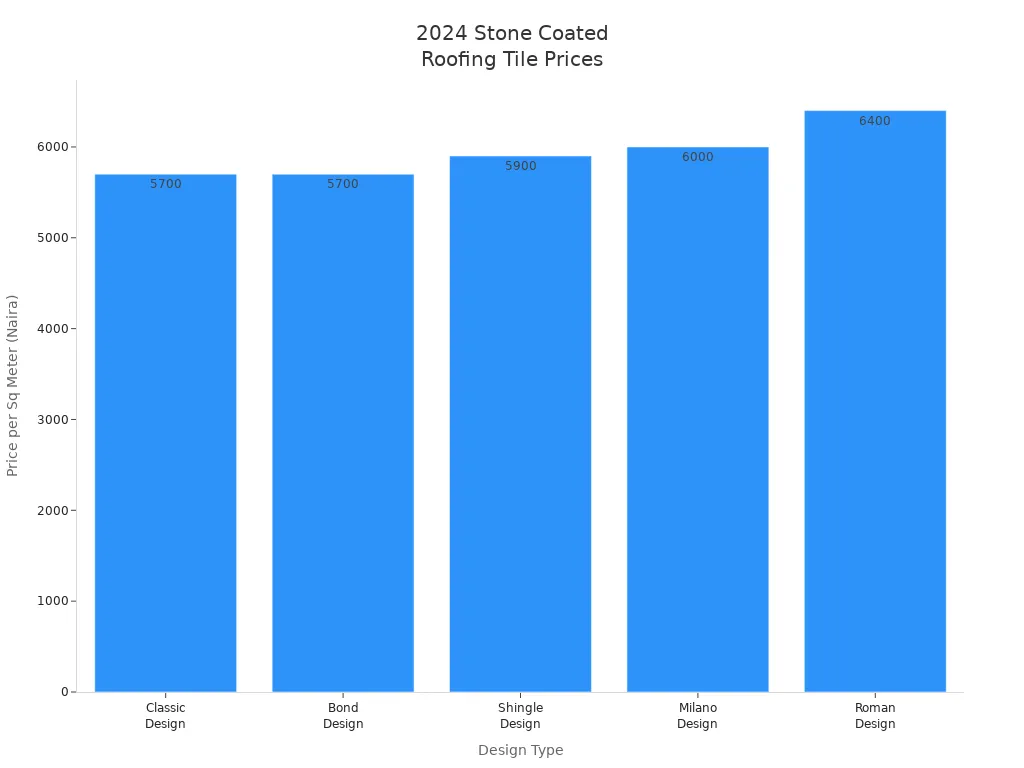
You should consider both the initial cost and the long-term value when you set your budget. Classic stone coated roofing tiles may cost more upfront than some other materials, but they deliver lasting value and protection.
Long-Term Savings
You get more than just a strong roof when you choose stone coated roofing tiles. You also enjoy long-term savings that add real value to your home. These tiles last 40 to 80 years, much longer than asphalt shingles, which usually need replacement after 20 to 30 years. You spend less on repairs and replacements, which lowers your total cost over time.
Stone coated roofing tiles also help you save on energy bills. The metal core reflects sunlight, which can reduce your cooling costs by up to 40%. Homeowners have reported a 39% drop in energy bills after switching to stone coated roofing. Asphalt shingles absorb heat, so you pay more to keep your home cool. The durability and energy efficiency of stone coated roofing tiles mean you get the long-term investment benefits you want.
Tip: When you look at the total value, stone coated roofing tiles give you more benefits and lower lifetime costs than cheaper options.
Warranty
You want peace of mind when you invest in a new roof. Leading manufacturers offer strong warranties for classic stone coated roofing tiles. For example, Novatik provides a 60-year technical warranty and a 30-year aesthetic warranty. This covers both the performance and the appearance of your roof. Another supplier offers a 50-year warranty, along with after-sale support and free spare parts.
These warranties show the confidence manufacturers have in the value and durability of their roofing products. You protect your budget from unexpected repair costs and know your investment will last. Always check the warranty terms before you buy, so you get the best value for your money.
Note: A good warranty adds extra value to your roofing project and protects your home for decades.
Comparing Roofing Options
Stone Coated vs. Asphalt
When you compare stone coated roofing tiles to asphalt shingles, you see big differences in durability, weather resistance, and cost over time. Stone coated roofing tiles use aluminized zinc steel plates covered with natural stone granules. This design gives you a roof that lasts up to 50 years or more. Asphalt shingles usually last only 10 to 20 years. You often need to replace asphalt shingles because they crack, fade, and lose granules. Stone coated roofing tiles resist corrosion, impact, and harsh weather, even in coastal areas.
You pay more upfront for stone coated roofing tiles, but you save money in the long run. Asphalt shingles seem cheaper at first, but frequent repairs and replacements add up. Stone coated roofing tiles lower your maintenance costs and can even reduce your insurance premiums. You also get better energy savings because these tiles reflect sunlight and help regulate your home’s temperature.
| Aspect | Stone Coated Roofing Tiles | Asphalt Shingles |
|---|---|---|
| Lifespan | 40 to 70 years (commonly 50 years) | 10 to 20 years |
| Weather Resistance | High resistance to heavy rain, strong winds, hail, UV, moisture, corrosion, and impact damage | Prone to cracking, granule loss, water penetration, and damage from heat and environmental factors |
| Initial Cost | Higher upfront cost due to premium materials and installation | Lower initial cost, easier installation |
| Long-term Cost | Lower maintenance, fewer replacements, energy savings, insurance discounts | Higher maintenance and replacement frequency, leading to higher lifetime costs |
| Maintenance | Easy cleaning, minimal maintenance required | Frequent repairs and cleaning needed |
Tip: If you want a roof that lasts and protects your home from tough weather, stone coated roofing tiles offer better value than asphalt shingles.
Stone Coated vs. Clay/Concrete
You might wonder how stone coated roofing tiles compare to clay or concrete tiles. Clay tiles give you a long lifespan, often 50 to 80 years, but they are very heavy. Concrete tiles weigh even more and may need extra support for your roof. Stone coated roofing tiles are much lighter, so you usually do not need to reinforce your roof structure. This makes installation easier and less expensive.
Clay tiles resist fading, mold, and mildew, but you still need to check for cracks after storms. Concrete tiles need more cleaning to prevent moss and mildew, especially in humid places like roofing tiles bangalore. Stone coated roofing tiles do not crack and need less maintenance. Their impact resistance and durability make them a smart choice if you want a strong, low-maintenance roof.
| Aspect | Clay Tiles | Concrete Tiles | Stone-Coated Metal Tiles |
|---|---|---|---|
| Weight | Very heavy (600-1,500 lbs/square), often requires structural reinforcement | Heavier than clay (900-1,200 lbs/square), may need substantial reinforcement | Lightweight (50-150 lbs/square), usually no extra reinforcement needed |
| Installation | More complex and costly due to weight and reinforcement needs | Similar to clay, possibly more demanding due to extra weight | Easier and less costly installation due to light weight and no reinforcement |
| Maintenance | Low-maintenance; occasional checks for cracks; resistant to fading, mold, mildew | Requires more frequent cleaning to prevent moss/mildew; prone to color fading | Very durable and impact-resistant; does not crack; less maintenance related to damage |
| Durability | Long lifespan (50-80+ years); prone to cracking under impact | Durable but more upkeep needed for appearance | Long lifespan (40-70 years); highly impact-resistant and fire-resistant |
Note: When comparing types of stone coated roofing tiles to clay or concrete, you get the same classic look with less weight and easier care.
Stone Coated vs. Metal
You may also consider metal roofing. Standing seam metal roofs use plain aluminum or steel. These types reflect sunlight well and help lower cooling costs. However, they can be noisy during heavy rain or hail unless you add extra insulation. Stone coated roofing tiles have a textured, granulated surface that absorbs sound, making your home quieter during storms.
Both types offer strong durability and weather resistance. Stone coated roofing tiles provide better noise reduction and a more traditional look. You can improve insulation with underlayment and reflective coatings. If you want a roof that combines quiet comfort, energy efficiency, and classic style, stone coated roofing tiles stand out among the types of roofing available.
Tip: When comparing types of stone coated roofing tiles to plain metal, you get a quieter, more attractive roof with excellent durability and resistance to weather.
Installation and Maintenance
Preparation
Proper preparation ensures your roofing project starts strong and lasts for decades. You should always begin with a thorough inspection of your existing roof. Check the structure for any signs of damage or weakness. Remove old roofing materials if needed, or make sure the current shingles are in good condition. This step helps you avoid future problems.
Follow these steps for the best results:
- Inspect the roof decking for damage or rot. Repair any weak spots to create a solid base for your new roofing.
- Remove all old roofing materials, including nails and debris.
- Clean the surface to ensure nothing interferes with the installation.
- Install a water-resistant underlayment. This layer protects your home from leaks and moisture.
- Plan the layout of your roofing tiles, marking where each row will start.
Tip: Careful preparation leads to a smoother installation and a longer-lasting roof.
Installation Steps
Classic stone coated roofing tiles offer lightweight and easy installation. You can choose between two main methods: the batten system and the direct-deck system. The batten system uses a grid of battens to create an air gap, which improves ventilation and keeps your roofing cooler. The direct-deck system attaches the tiles directly to the roof deck, which works best in areas with less wind.
Here are the key stages of the installation process:
- Lay out the battens or prepare the deck, depending on your chosen method.
- Start installing the roofing tiles from the bottom edge, working upward in overlapping rows.
- Secure each tile with special nails or screws designed for roofing. This step ensures your tiles stay in place during storms.
- Install flashings around edges, valleys, vents, and chimneys. Flashings protect vulnerable areas from water leaks.
- Trim any excess tile material and seal the edges to prevent water from getting underneath.
- Complete a final inspection to check for proper fastening and overall quality.
Note: Professional installation helps you get the most from your roofing. Always follow manufacturer guidelines for the best results.
Maintenance Tips
You can extend the life of your roofing with simple maintenance. Regular care keeps your roof looking great and performing well in all weather. Here are some tips to help you protect your investment:
- Inspect your roofing twice a year, especially after storms. Look for loose, bent, or chipped tiles.
- Remove debris like leaves and twigs from the surface and gutters. This prevents water backup and moss growth.
- Trim tree branches at least two to three feet away from your roofing. This reduces debris and prevents physical damage.
- Clean your roofing every three to six months using mild detergents and soft brushes. Avoid pressure washing, which can damage the stone coating.
- Repair any damaged tiles right away to prevent leaks.
- Apply UV-resistant sealants every few years to protect against sun damage.
- Avoid walking on your roofing. If repairs are needed, hire professionals.
- Schedule a professional inspection every five years to check fasteners and spot hidden issues.
Callout: Consistent maintenance ensures your roofing stays strong, beautiful, and energy-efficient for decades.
Customization and Design
Colors and Finishes
You have many options when you choose stone coated roofing tiles for your home. These tiles come in a wide range of colors and finishes. You can find shades that look like classic asphalt shingles, warm clay tiles, or rustic wood shakes. Some tiles even offer finishes that mimic Old-World Italian clay, giving your home a timeless look.
The variety of colors lets you match your roof to your personal style. You might want a bold red to make your home stand out, or a soft gray for a modern touch. The finishes also help your roof blend with the natural surroundings or highlight special features of your home. No matter which style you pick, these tiles keep their color and texture for many years. The stone coating resists fading, so your home always looks fresh and well cared for.
Tip: Choosing the right color and finish can boost your home’s curb appeal and make it more attractive to visitors or buyers.
Stone coated roofing tiles do more than look good. They also protect your home from harsh weather. The durable finish keeps your roof strong, even in heavy rain or bright sun. You get both beauty and strength in one roofing solution.
Architectural Styles
You can use stone coated roofing tiles on many types of homes. These tiles work well with both traditional and modern designs. If you have a bungalow, villa, or even a heritage building, these tiles can match the style perfectly. The curved shapes often mimic clay or terracotta tiles, which fit well with classic architecture.
Design experts say these tiles also suit resorts, holiday homes, and religious or institutional buildings. The wide choice of profiles and colors means you can find the right look for any home. For modern homes, sleek profiles and cool tones create a stylish effect. For traditional homes, warm earth tones and textured finishes keep the classic feel.
Here is a quick look at which architectural styles work best with stone coated roofing tiles:
| Architectural Style | Why It Works Well |
|---|---|
| Bungalows and Villas | Classic curves and colors match traditional designs |
| Resorts and Holiday Homes | Durable and attractive for high-traffic locations |
| Heritage Buildings | Mimics clay or terracotta, preserving historic looks |
| Religious/Institutional | Strong, long-lasting, and visually impressive |
- Stone coated roofing tiles blend with Indian styles like Mughal or South Indian temple designs.
- You can also use them for urban homes, thanks to their modern finishes.
- Experts recommend matching home architecture with the right tile color and texture for the best results.
When you choose the right style and finish, you help your home stand out while keeping it protected. The flexibility of these tiles makes them a smart choice for almost any home.
Real Experiences
Case Studies
You can learn a lot from real homeowners who have chosen classic stone coated roofing tiles. Many people in different climates have shared their stories. For example, a family in a coastal city faced strong winds and heavy rain every year. After switching to stone coated roofing, they noticed fewer leaks and less damage during storms. Their energy bills dropped right away because the new roofing reflected sunlight and kept their home cooler.
Another homeowner in a humid region struggled with moss and algae on their old roof. After installing stone coated roofing, they saw a big change. The tiles resisted moss and mildew, so cleaning became much easier. The family also felt safer during storms because the roofing stayed secure and did not crack or warp.
A couple in a suburban neighborhood wanted to boost their property value. They chose a roofing style and color that matched their home’s design. After the installation, their home looked more attractive, and the appraisal value increased. They also enjoyed peace of mind knowing the roofing would last for decades with little maintenance.
Homeowners often report that the upfront cost pays off through long-term savings, lower energy bills, and fewer repairs.
Homeowner Tips
You can get the most value and satisfaction from your roofing project by following advice from experienced homeowners:
- Prioritize professional installation. Skilled installers help prevent leaks and make sure your roofing lasts.
- Use high-quality underlayment. This layer adds protection against leaks, improves fire resistance, and reduces noise inside your home.
- Make sure your home’s structure can support the weight of stone coated roofing, especially if you are upgrading from lighter materials.
- Choose roofing styles and colors that fit your home’s design. This step boosts curb appeal and can increase your property value.
- Expect a thorough installation process. Good installers will assess your roof structure and install the underlayment before adding the tiles.
- Plan for minimal maintenance. Stone coated roofing resists rust, corrosion, moss, mildew, and algae. In humid climates, you may need to clean the roof more often.
- Use proper cleaning methods. Avoid harsh tools or pressure washing, which can damage the roofing surface.
- Consider the higher upfront cost as an investment. The long lifespan and low maintenance needs of stone coated roofing lead to long-term savings.
Tip: Many homeowners notice immediate benefits, such as lower energy bills and greater peace of mind during storms.
You can enjoy a beautiful, durable roof that protects your home and adds value for years to come by following these tips.
You want a roof that stands up to every season. Classic stone coated roofing tiles give you that confidence. Industry experts highlight these key benefits:
- Withstand heavy rain, hail, high winds, freeze-thaw cycles, and fire
- Steel core and stone coating resist impact, mold, algae, and UV rays
- Reflect solar heat, lower cooling costs, and regulate indoor temperatures
- Lightweight design reduces structural load and makes roofing easier
- Minimal maintenance and many styles fit any home
- Sustainable materials and possible insurance savings
Always consider your local climate, check for certifications, and choose a skilled installer. Make your next roofing project a smart investment. Consult a professional to find the best roofing solution for your home.
FAQ
How long do stone coated roofing tiles last?
You can expect stone coated roofing tiles to last 40 to 70 years. Their steel core and protective coatings help them resist rust, fading, and impact. Most manufacturers offer warranties of 30 to 50 years for added peace of mind.
Are stone coated roofing tiles noisy during rain?
You will notice that stone coated roofing tiles absorb sound better than plain metal roofs. The stone granules and layered design reduce noise from rain and hail. Your home stays quieter, even during heavy storms.
Can you install stone coated roofing tiles on any roof?
You can install these tiles on most roof types, including steep or low-pitch roofs. Their lightweight design works well for new homes and roof replacements. Always check with a professional installer to ensure your roof structure is suitable.
Do stone coated roofing tiles require special maintenance?
You will find maintenance easy. Inspect your roof twice a year, remove debris, and clean with mild soap and water. Avoid harsh chemicals or pressure washing. Promptly repair any damaged tiles to keep your roof in top condition.
Are stone coated roofing tiles energy efficient?
You benefit from energy savings with these tiles. The reflective surface helps keep your home cooler in summer. Their insulation properties also help maintain comfortable indoor temperatures year-round, reducing your energy bills.
Will stone coated roofing tiles fade or lose color?
You do not need to worry about fading. The natural stone granules and UV-resistant coatings keep colors vibrant for decades. Your roof will look fresh and attractive with minimal effort.
Can you walk on stone coated roofing tiles?
You can walk on these tiles if needed, but always step carefully and use soft-soled shoes. Try to limit foot traffic to prevent accidental damage. For repairs or inspections, hire a professional for safety.
Are stone coated roofing tiles environmentally friendly?
You make an eco-friendly choice with these tiles. Manufacturers use recyclable steel and natural stone granules. The long lifespan and energy efficiency also help reduce waste and lower your home’s carbon footprint.

